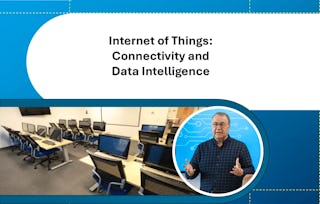Have you wondered how “Things” talk to each other and the cloud? Do you understand the alternatives for conveying latency-sensitive real time data versus reliable signaling data? Building on the skills from the Sensing and Actuation course, we will explore protocols to exchange information between processors.

Ends soon: Gain next-level skills with Coursera Plus for $199 (regularly $399). Save now.

Internet of Things: Communication Technologies
This course is part of Internet of Things and AI Cloud Specialization


Instructors: Ganz Chockalingam
36,176 already enrolled
Included with
(507 reviews)
Skills you'll gain
Details to know

Add to your LinkedIn profile
4 assignments
See how employees at top companies are mastering in-demand skills

Build your subject-matter expertise
- Learn new concepts from industry experts
- Gain a foundational understanding of a subject or tool
- Develop job-relevant skills with hands-on projects
- Earn a shareable career certificate

There are 5 modules in this course
Welcome to the Internet of Things! Before diving into this course give us a chance to let you know what it is all about! We will walk you through a module by module outline that will give you highlights on the interesting aspects of the course.
What's included
1 video1 reading
In this course, you will see a lot of new words and acronyms you might not be familiar with. If you feel comfortable with your knowledge of tech terminology, feel free to skip these lessons since they will not affect the overall integrity of the course. If you see something that you want to know a little more about, feel free to watch the video to gain insight on some basic concepts. We do expect you to know the majority of this material before going into the next module, we would recommend going through the lessons as a quick brush up.
What's included
14 videos1 assignment
This module will take a high level look at what VoIP is in a nutshell. Essentially, we would like to talk a little more in depth about the key terms you may have seen in module 1. We will also go over a great open source VoIP application called Linphone, and explain a variety of ways you can use this open source code to expand on a VoIP application we will be making later on in the course. We will take a look at SIP and look at some online resources that might help you to understand the inner working of VoIP.
What's included
17 videos1 assignment
In this module our esteemed Professor Harinath Garudadri will talk about coders and decoders (Codecs). This will allow us to make better use of the communications in the data plane.We want to look at the motivation behind using Codecs, the different ways to take advantage of redundancies when using codecs and finally the ability to take advantage of different receiver / transmitter combinations. If we are able to understand the way that information is sent and received over the data plane we can create and use the right codecs.
What's included
15 videos1 assignment
The main part of this module will focus on you making your very own VoIP application on the Android operating system. In order to do this, you might have to brush up on some of the materials in Course 2. You will be required to use Android Studio to push the application onto your board. You will need to know how to use Git, adb and possibly fastboot in order to accomplish this. We will provide you with the code for your application, but remember, the code we are giving you is only a template that can be used to build a bigger and better application with a wide variety of functions. Once we have built your application and pushed it to your board, we will sit together and brainstorm everything we have seen in the last few courses and take a look at what we are now capable of building in the IoT market.
What's included
13 videos2 readings1 assignment
Earn a career certificate
Add this credential to your LinkedIn profile, resume, or CV. Share it on social media and in your performance review.
Instructors


Offered by
Explore more from Computer Security and Networks
 Status: Free Trial
Status: Free TrialUniversity of Illinois Urbana-Champaign

University of California San Diego
 Status: Free Trial
Status: Free TrialUniversity of California San Diego
 Status: Free Trial
Status: Free Trial
Why people choose Coursera for their career




Learner reviews
507 reviews
- 5 stars
69.42%
- 4 stars
24.26%
- 3 stars
2.95%
- 2 stars
1.97%
- 1 star
1.38%
Showing 3 of 507
Reviewed on May 7, 2020
explanation is very clear sir..better to explain with practical orientation....thank q sir
Reviewed on Feb 2, 2019
Was a good course. Videos lectures could be better prepared. The Codecs were a bit complex and needed extra reference material
Reviewed on Jan 6, 2020
Good understanding of subject matter and very good explaination in simple language.

Open new doors with Coursera Plus
Unlimited access to 10,000+ world-class courses, hands-on projects, and job-ready certificate programs - all included in your subscription
Advance your career with an online degree
Earn a degree from world-class universities - 100% online
Join over 3,400 global companies that choose Coursera for Business
Upskill your employees to excel in the digital economy
Frequently asked questions
To access the course materials, assignments and to earn a Certificate, you will need to purchase the Certificate experience when you enroll in a course. You can try a Free Trial instead, or apply for Financial Aid. The course may offer 'Full Course, No Certificate' instead. This option lets you see all course materials, submit required assessments, and get a final grade. This also means that you will not be able to purchase a Certificate experience.
When you enroll in the course, you get access to all of the courses in the Specialization, and you earn a certificate when you complete the work. Your electronic Certificate will be added to your Accomplishments page - from there, you can print your Certificate or add it to your LinkedIn profile.
Yes. In select learning programs, you can apply for financial aid or a scholarship if you can’t afford the enrollment fee. If fin aid or scholarship is available for your learning program selection, you’ll find a link to apply on the description page.
More questions
Financial aid available,

